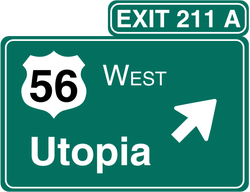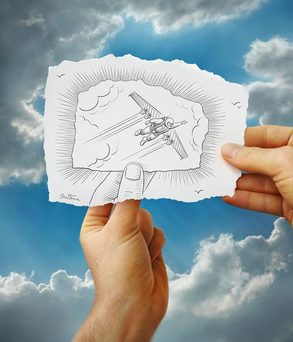The Utopian Community is highly structured, uniform, and yet its citizens are capable - to an extent - of pursuing their interests and being free. Utopians have about six hours a day on average of time to do with what they like. Utopian morals are in check, they do not engage in pre-marital sex or put wealth (gold, belongings) on a pedestal. They operate under a "just" court-system; those who steal, commit adultery, or other various crimes become slaves. All people are given equal opportunities and spend equal amounts of time gaining agricultural skills.
One question came into my mind again and again throughout reading Utopia: what is the point? Try as I might, I couldn't understand if there was anything the Utopians were striving for. What use were their education and skills if their lives were already predefined for them? Utopians need more vigor, more choice, something to gradually attain. In other words, their lives lack purpose. For a community to be healthy it needs a reason to keep going! Everyone invested in the community has to have a common goal.
One question came into my mind again and again throughout reading Utopia: what is the point? Try as I might, I couldn't understand if there was anything the Utopians were striving for. What use were their education and skills if their lives were already predefined for them? Utopians need more vigor, more choice, something to gradually attain. In other words, their lives lack purpose. For a community to be healthy it needs a reason to keep going! Everyone invested in the community has to have a common goal.
Utopians don't celebrate uniqueness in one another or themselves. They don't wear clothes of different colors or paint their homes purple if they'd like. Although many problems in society are solved within Utopia, it brings on completely new issues. I think that a community is closer to perfection because of the distinct flavor all-their-own each person brings to the group. Community is strongest when each member has a sense of their own identity and the group identity as well. I can't imagine a Utopian having a true sense of who they are. It's true that individuality isn't defined by outward things such as possessions and style as much as it is the unique spark in every persons soul, however it doesn't hurt to be able to express the brightness and colors of your inside, outside.
Utopia has bizarre double-standards around the sexes, for although it says men and women have equal opportunities it says on page 104 that "both wives and children fall on their knees before their husbands or parents and confess everything in which they have either erred or failed in their duty, and beg pardon for it." That is worrisome to me, for I don't believe any society can function with such requirements. Where do the men confess? Or are they incapable of sin?
Utopia lacks the balance of choice and order, principle and love, which go together so harmoniously. I respect their treatment of the environment and disinterest in materialism, but Utopian citizens seem to me to closely represent clones or robots rather than people.
Utopia has bizarre double-standards around the sexes, for although it says men and women have equal opportunities it says on page 104 that "both wives and children fall on their knees before their husbands or parents and confess everything in which they have either erred or failed in their duty, and beg pardon for it." That is worrisome to me, for I don't believe any society can function with such requirements. Where do the men confess? Or are they incapable of sin?
Utopia lacks the balance of choice and order, principle and love, which go together so harmoniously. I respect their treatment of the environment and disinterest in materialism, but Utopian citizens seem to me to closely represent clones or robots rather than people.



